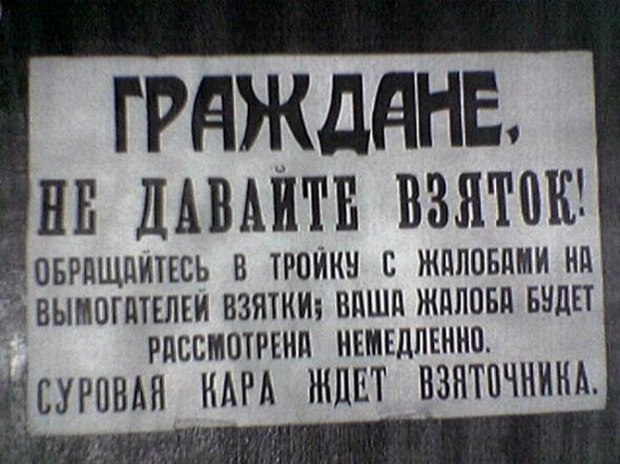‘In the countries with such religions like Orthodoxy, Islam, the level of corruption is higher…’
The impact of culture on the level of corruption
A historian Lenar Zaynullin considers the Russia's 'disease' of corruption not through the prism of economy and politics but from the social and cultural point of view. In particular, he concludes that in the countries where there is the Protestant Church the level of corruption is much lower than in the Orthodox community or the Islamic world.
Three approaches to the corruption
The majority of the proposed explanations of corruption are political or economic but the cultural peculiarities of corrupt behaviour are poorly studied. In this connection, I would like in a more detailed way to understand this fragment of our life. On the basis of scientific works, the statistical data analysis and journalistic notes, there are three main motifs of an intertwining of thoughts that link the concepts of corruption and culture.
According to the first one, the corruption itself is a culture – business or organizational. The representatives of this approach define the culture of corruption as an organizational culture characterized by cynicism and the loss of common sense. Some features of the corruption culture are characteristic, apparently, for most Russian state institutions, especially for the lower echelons of power. It is characteristic, for example, that 40% of interviewed civil servants of Nizhny Novgorod note such features of local administration, such as bribery (41.7%) and bureaucracy (44.4%).
The second approach goes back to the main functions, which are formed due to the new system of norms and values. Within its framework, the corruption is a temporary state, a dysfunction in the culture. It appears due to the fact that a large part of the population has no civic culture. Why has this become possible? The answer was quite interesting: first, they praised material values for the whole society but only a certain stratum of people had the possibilities. From this point of view, the promotion of entrepreneurship (business) among the civil servants was not relevant and not fashionable.
In the framework of the third approach, the corruption is defined not as temporary, disease state but as a state constantly produced by cultural tradition, based on permanent, sustainable features of national culture. This view became possible in the 1970s due to the opening firstly in the Third World and then in the Western countries of the informal economy, closely connected with local traditions and values (the studies of K. Hart). The researchers in their attempts to reveal the influence of culture on the corruption level started to resort to these dimensions of culture.

A gift to the bosses – an element of culture
Due to these observations, there arose a hypothesis that the level of corruption in the republics of the former USSR was affected by the inherent cultural differences: the behaviour associated with the importance of family ties in the Caucasus, the tradition of giving gifts in the Central Asian republics.
V. Aruntanes and other researchers note the connection between the presenting of gifts as a norm of business relations and a high proportion of the context of culture. In these countries, a large part of communication occurs at a nonverbal level, and success of the negotiations depends to a greater extent on friendly relations and trust of the parties to each other rather than the provisions clearly stated in the contract.
On the contrary, in the low context cultures people are not inclined to lend and do not like to be obliged, in business they rely on formal relationships and laws and the clearly stated provisions of the contract, preferring short-term transactions (the cultures of the United States, Germany and Switzerland). The high context cultures are the cultures of Japanese, Arabs and Mediterraneans (Italian, Spanish, Turkish), from the point of view of which the giving gifts — it is a necessary condition of the reliable business relations.
The religious factor: Protestantism against corruption
Another cultural factor of corruption is a religion. In this respect, we have managed found out the relation of the hierarchy of religion in society with the level of corruption. The modern analysis has shown that Catholicism, Orthodoxy, Islam are more prone to corruption than the countries where the hierarchy of religion is much lower (Protestantism). Later these results have been confirmed in a selection of 114 countries. In another study it was found that in the countries with these religions and faiths, like Catholicism, Orthodoxy, Islam, Buddhism and Hinduism, the level of corruption is higher than in the countries with tribal religions and reformed Christianity (Protestantism and Anglicanism).
After the Soviet period, one of the researches of this kind was 'The Shadow Russia' by I. Klyamkin and L. Timofeyev, where it is noted that in Russia a prejudice-suspicious attitude towards shadow economic behaviour is replaced by a feeling of understanding and solidarity. The vast majority of Russians (86%) regard the issue of combating the shadow economy and corruption either the most important or one of the most important, but nearly 40% maintain a positive or neutral attitude towards the direct or indirect participation in the informal practice.
Thus, in order to combat corruption it is not enough to solve the economic problems, the strengthening of the supervisory authorities, the introduction of draconian laws. The complex study of values of mass consciousness of the society who make the informal economic behaviour legal is needed. All this will give people an opportunity to understand their problem, which certainly will be one of the best tools in the fight against corruption.